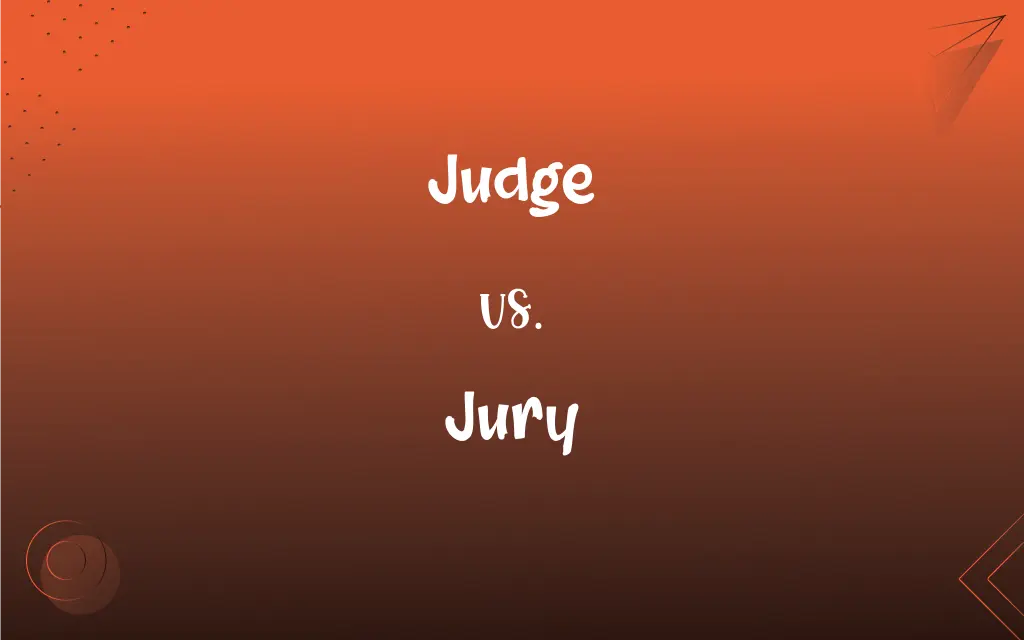Judge vs. Jury: What's the Difference?
Edited by Aimie Carlson || By Janet White || Published on November 19, 2023
A Judge is an appointed or elected official who presides over court proceedings. A Jury is a group of citizens selected to evaluate evidence and determine a verdict in a trial.

Key Differences
A Judge is an individual, either appointed or elected, who holds a position of authority within the legal system. In contrast, a Jury consists of multiple individuals, usually citizens without legal training, brought together to serve in a specific trial.
The role of a Judge primarily revolves around interpreting and applying the law, ensuring trial proceedings are fair, and often deciding sentences or legal outcomes in cases without juries. Conversely, a Jury's primary responsibility is to hear evidence, deliberate, and decide the guilt or innocence of a defendant based on the facts presented.
While a Judge often provides instructions, explaining legal principles and guidelines the Jury must follow, it's the Jury that listens to witnesses, assesses their credibility, and makes factual determinations based on the evidence shown.
In some trials, particularly bench trials, a Judge will perform the role of both judge and jury, making determinations of fact as well as of law. On the other hand, in jury trials, while the Judge handles questions of law, it's the Jury that delivers the verdict after deliberations.
To sum it up, while a Judge provides the legal framework and ensures the right procedures are followed, a Jury represents the community's voice, delivering a verdict after considering all presented evidence.
ADVERTISEMENT
Comparison Chart
Composition
Individual official.
Group of selected citizens.
Role
Interprets and applies the law.
Evaluates evidence, determines verdict.
Training
Typically has legal training and experience.
Usually lacks formal legal training.
Authority
Oversees trial proceedings, provides legal framework.
Decides on the facts, delivers verdict.
Type of Trial
Presides over both bench and jury trials.
Only involved in jury trials.
ADVERTISEMENT
Judge and Jury Definitions
Judge
A person who interprets laws and regulations.
The Judge clarified the legal precedent.
Jury
A body of individuals selected to hear evidence and determine factual issues.
The defense presented its case to the Jury.
Judge
An individual who presides over court proceedings, ensuring they are conducted fairly.
The Judge reminded the attorneys of courtroom decorum.
Jury
Individuals jointly responsible for a decision in legal proceedings.
The Jury's decision was unanimous.
Judge
To form an opinion or estimation of after careful consideration
Judge heights.
Judging character.
Jury
Citizens chosen to decide the guilt or innocence of a person on trial.
The Jury deliberated for three hours before reaching a verdict.
Judge
(Law) To hear and decide on in a court of law
Judge a case.
Jury
A panel assessing the merits of a matter in certain competitions or disputes.
She was selected as a member of the art show Jury.
Judge
To pass sentence on; condemn.
Jury
A group of people sworn to render a verdict in a trial.
The Jury listened intently to the witness.
Judge
To act as one appointed to decide the winners of
Judge an essay contest.
Jury
(Law) A body of persons selected to decide a verdict in a legal case, based upon the evidence presented, after being given instructions on the applicable law. Also called petit jury, trial jury.
Judge
To determine or declare after consideration or deliberation
Most people judged him negligent in performing his duties as a parent.
Jury
A committee that judges contestants or applicants, as in a competition or exhibition; a panel of judges.
Judge
(Informal) To have as an opinion or assumption; suppose
I judge you're right.
Jury
To judge or evaluate by a jury
Jurying submitted samples for a crafts fair.
Judge
(Bible) To govern; rule. Used of an ancient Israelite leader.
Jury
Intended or designed for temporary use; makeshift
A jury sail.
Judge
To form an opinion or evaluation.
Jury
(law) A group of individuals chosen from the general population to hear and decide a case in a court of law.
Judge
To act or decide as a judge.
Jury
A group of judges in a competition.
Judge
One who makes estimates as to worth, quality, or fitness
A good judge of used cars.
A poor judge of character.
Jury
The audience attending the first night of a performance, whose reaction may determine whether it succeeds or fails.
Judge
(Law) A public official who hears and decides cases brought in court.
Jury
To judge by means of a jury.
Judge
(Law) A public official who hears and decides cases or matters in a forum other than a court, such as an administrative proceeding.
Jury
(nautical) For temporary use; applied to a temporary contrivance.
Jury mast
Jury rudder
Judge
One appointed to decide the winners of a contest or competition.
Jury
For temporary use; - applied to a temporary contrivance.
Judge
A leader of the Israelites during a period of about 400 years between the death of Joshua and the accession of Saul.
Jury
A body of people, selected according to law, impaneled and sworn to inquire into and try any matter of fact, and to render their true verdict according to the evidence legally adduced. In criminal trials the number of such persons is usually twelve, but in civil cases and in grand juries it may different. See Grand jury under Grand, and Inquest.
The jury, passing on the prisoner's life.
Judge
Judges (used with a sing. verb) See Table at Bible.
Jury
A committee for determining relative merit or awarding prizes at an exhibition or competition; as, the art jury gave him the first prize.
Judge
A public official whose duty it is to administer the law, especially by presiding over trials and rendering judgments; a justice.
Jury
A body of citizens sworn to give a true verdict according to the evidence presented in a court of law
Judge
A person who decides the fate of someone or something that has been called into question.
Jury
A committee appointed to judge a competition
Judge
A person officiating at a sports event, a contest, or similar.
At a boxing match, the decision of the judges is final.
Judge
A person who evaluates something or forms an opinion.
She is a good judge of wine.
They say he is a poor judge of character considering all the unreliable friends he has made.
Judge
A shophet, a temporary leader appointed in times of crisis in ancient Israel.
Judge
(transitive) To sit in judgment on; to pass sentence on (a person or matter).
A higher power will judge you after you are dead.
Judge
(intransitive) To sit in judgment, to act as judge.
Justices in this country judge without appeal.
Judge
(transitive) To judicially rule or determine.
Judge
To sentence to punishment, to judicially condemn.
He was judged to die for his crimes.
Judge
To award judicially; to adjudge.
Judge
(transitive) To form an opinion on; to appraise.
I judge a man’s character by the cut of his suit.
Judge
To constitute a fitting appraisal or criterion of; to provide a basis for forming an opinion on.
Judge
(intransitive) To arbitrate; to pass opinion on something, especially to settle a dispute etc.
We cannot both be right: you must judge between us.
Judge
(transitive) To have as an opinion; to consider, suppose.
I judge it safe to leave the house once again.
Judge
(ambitransitive) To form an opinion; to infer.
I judge from the sky that it might rain later.
Judge
(ambitransitive) To criticize or label another person or thing.
Judge
(ambitransitive) To govern as biblical judge or shophet (over some jurisdiction).
Judge
A public officer who is invested with authority to hear and determine litigated causes, and to administer justice between parties in courts held for that purpose.
The parts of a judge in hearing are four: to direct the evidence; to moderate length, repetition, or impertinency of speech; to recapitulate, select, and collate the material points of that which hath been said; and to give the rule or sentence.
Judge
One who has skill, knowledge, or experience, sufficient to decide on the merits of a question, or on the quality or value of anything; one who discerns properties or relations with skill and readiness; a connoisseur; an expert; a critic.
A man who is no judge of law may be a good judge of poetry, or eloquence, or of the merits of a painting.
Judge
A person appointed to decide in a trial of skill, speed, etc., between two or more parties; an umpire; as, a judge in a horse race.
Judge
One of the supreme magistrates, with both civil and military powers, who governed Israel for more than four hundred years.
Judge
The title of the seventh book of the Old Testament; the Book of Judges.
Judge
To hear and determine, as in causes on trial; to decide as a judge; to give judgment; to pass sentence.
The Lord judge between thee and me.
Father, who art judgeOf all things made, and judgest only right!
Judge
To compare facts or ideas, and perceive their relations and attributes, and thus distinguish truth from falsehood; to determine; to discern; to distinguish; to form an opinion about.
Judge not according to the appearance.
She is wise if I can judge of her.
Judge
To hear and determine by authority, as a case before a court, or a controversy between two parties.
Judge
To examine and pass sentence on; to try; to doom.
God shall judge the righteous and the wicked.
To bring my whole cause 'fore his holiness,And to be judged by him.
Judge
To arrogate judicial authority over; to sit in judgment upon; to be censorious toward.
Judge not, that ye be not judged.
Judge
To determine upon or deliberation; to esteem; to think; to reckon.
If ye have judged me to be faithful to the Lord.
Judge
To exercise the functions of a magistrate over; to govern.
Make us a king to judge us.
Judge
A public official authorized to decide questions bought before a court of justice
Judge
An authority who is able to estimate worth or quality
Judge
Determine the result of (a competition)
Judge
Form an opinion of or pass judgment on;
I cannot judge some works of modern art
Judge
Judge tentatively or form an estimate of (quantities or time);
I estimate this chicken to weigh three pounds
Judge
Pronounce judgment on;
They labeled him unfit to work here
Judge
Put on trial or hear a case and sit as the judge at the trial of;
The football star was tried for the murder of his wife
The judge tried both father and son in separate trials
Judge
A public official with authority to hear cases in a court of law.
The Judge issued a ruling on the motion.
Judge
An individual tasked with deciding or settling a question or dispute.
As the contest's Judge, she had the final say.
Judge
An expert who evaluates the quality or worth of something.
He served as a Judge at the wine-tasting event.
FAQs
Who decides the verdict in a jury trial?
The Jury decides the verdict in a jury trial.
Who provides legal instructions in a trial?
The Judge provides legal instructions to the Jury.
Who determines sentencing in a criminal trial?
The Judge often determines sentencing in criminal trials.
How many people typically make up a Jury?
A standard Jury often consists of 12 members, though this can vary.
How is a Jury selected?
A Jury is selected through a process called voir dire, where potential jurors are questioned.
Do Judges always have legal training?
Yes, Judges typically have legal training and experience.
Who maintains order in the courtroom?
The Judge maintains order in the courtroom.
Can anyone serve on a Jury?
Jury members are typically selected citizens, though there are certain eligibility criteria.
What's a bench trial?
A bench trial is where the Judge, not a Jury, determines the verdict.
Can a Judge dismiss a juror?
Yes, a Judge can dismiss a juror for various reasons.
Can Judges give their opinions on cases?
While Judges interpret and apply the law, they must remain impartial and not express personal opinions on cases.
How long can a Jury deliberate?
There's no set time limit for Jury deliberations; it varies case by case.
What's a hung jury?
A hung Jury occurs when jurors can't reach a unanimous decision.
Who ensures legal procedures are followed during a trial?
The Judge ensures that legal procedures are correctly followed.
What is the Jury's role in determining facts?
The Jury listens to evidence and witnesses to determine factual aspects of a case.
Why are Juries considered representative of the community?
Juries are drawn from the community and are meant to reflect its diverse perspectives in the justice process.
Can a Judge overrule a Jury's decision?
A Judge can't change a Jury's not guilty verdict but can overturn a guilty verdict if deemed against the weight of evidence.
What happens if a juror is biased?
If a juror is found to be biased, they are typically dismissed and replaced.
Does a Judge participate in Jury deliberations?
No, the Judge doesn't participate in Jury deliberations.
Are Juries used in all types of cases?
No, Juries are typically used in criminal trials and certain civil cases.
About Author
Written by
Janet WhiteJanet White has been an esteemed writer and blogger for Difference Wiki. Holding a Master's degree in Science and Medical Journalism from the prestigious Boston University, she has consistently demonstrated her expertise and passion for her field. When she's not immersed in her work, Janet relishes her time exercising, delving into a good book, and cherishing moments with friends and family.
Edited by
Aimie CarlsonAimie Carlson, holding a master's degree in English literature, is a fervent English language enthusiast. She lends her writing talents to Difference Wiki, a prominent website that specializes in comparisons, offering readers insightful analyses that both captivate and inform.































































